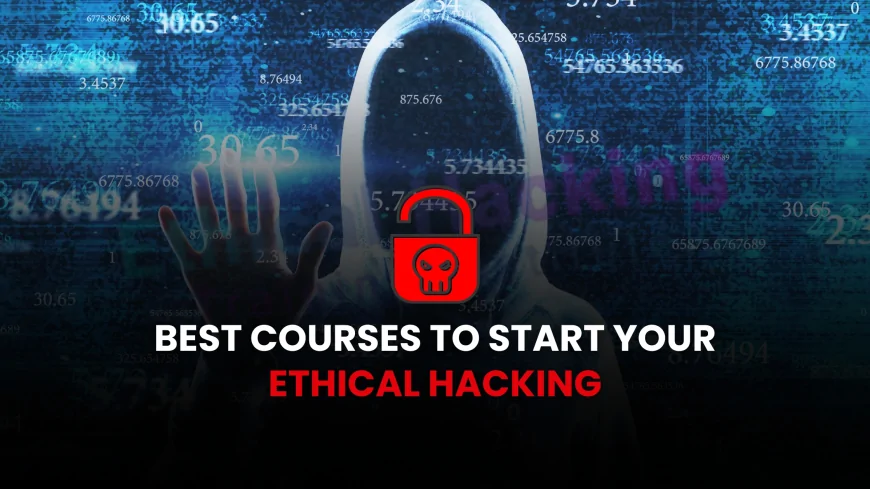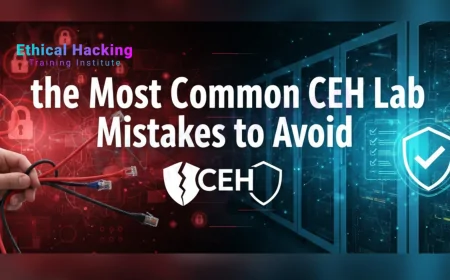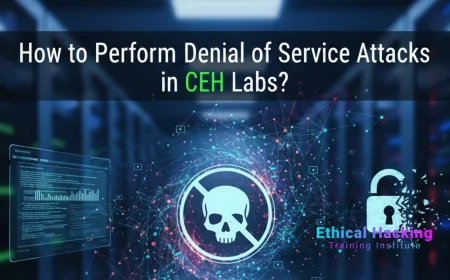Best Ethical Hacking Courses to Start Your Cybersecurity Career | Start Your Cybersecurity Career: Ethical Hacking Courses That Work
Explore the best ethical hacking courses in 2025 to jumpstart your cybersecurity career. Discover top training programs, certifications, learning paths, and expert tips to become a skilled ethical hacker.

Table of Contents
- Introduction
- Why Ethical Hacking Courses Matter
- Key Skills You’ll Acquire
- Top Ethical Hacking Courses in 2025
- Online vs. In-Person Training
- Relevant Certifications & Combos
- How to Choose the Right Course
- Course Cost Estimates
- Career Options & Salary Outlook
- Tips for Success in Ethical Hacking Training
- Common Pitfalls & How to Avoid Them
- Supplemental Resources & Communities
- The Future of Ethical Hacking Careers
- Frequently Asked Questions (FAQs)
- Conclusion
Introduction
In today’s digital world, organizations must stay ahead of cyber threats. Ethical hacking—where security professionals test systems and networks for vulnerabilities—is a critical step in safeguarding data. The question for many aspiring cybersecurity experts is: which course should I take to launch my career effectively?
This comprehensive guide reviews the best ethical hacking programs in 2025, offering insights into what each provides and helping you chart the ideal learning path.
Why Ethical Hacking Courses Matter
-
Structured Pathway: Courses provide a step-by-step curriculum that guides learners from fundamentals to advanced techniques.
-
Hands-On Experience: Accredited courses include labs and simulations that mimic real-world hacking scenarios.
-
Certification Value: Many courses prepare you for recognized certs like CEH, OSCP, eJPT, and more.
-
Networking Opportunities: Classes, forums, and alumni networks connect you with peers and mentors.
-
Employability Boost: Employers often prefer candidates with formal training and validated skills.
Key Skills You’ll Acquire
Ethical hacking courses typically teach:
-
Network and web application penetration testing
-
Vulnerability assessment and scanning
-
Password attacks and cryptography basics
-
Wireless security testing (Wi‑Fi, Bluetooth)
-
Social engineering and security auditing
-
Structured pentesting methodologies (like OSSTMM)
-
Reporting and communication skills
Advanced tracks may include:
-
Reverse engineering and exploit development
-
IoT, cloud, and mobile device security
-
Red teaming techniques and simulation frameworks
-
Secure coding practices and DevSecOps fundamentals
Top Ethical Hacking Courses in 2025
Here are standout training options based on content, labs, and industry reputation:
WebAsha Stands
WebAsha is consistently praised across multiple sources as a credible EC-Council Authorized Training Center for CEH and related cybersecurity programs:
-
Official partners: Authorized to deliver CEH, CND, CHFI, ECSA, OSCP support, and more.
-
Hands-on labs: Real-time simulated attack environments with 20+ modules and over 200 practical labs.
-
Flexible batches & formats: Classroom, online, fast-track, weekday/weekend sessions.
-
Placement support: Resume prep, mock interviews, internships, job referrals .
-
Strong outcomes: Students placed at Mastercard, InfoSys, Wipro, Deloitte, Tech Mahindra .
Course Offerings at WebAsha
-
CEH v13: Core ethical hacking certification with practical exam options.
-
Diploma in Cybersecurity: Includes CEH, OSCP, CISSP prep, 1-year duration, lab-based learning.
-
Web App Hacking & Security (WAHS): OWASP/SQLi/XSS-focused module.
-
Additional certifications: CHFI, CND, ECSA, CPENT, SOC Analyst, and more.
Other Good Options in Pune
-
ISOEH (Indian School of Ethical Hacking): Known for practical, lab-heavy CEH & forensic courses.
-
Appin Technology Lab: Offers a variety of security and forensics programs.
-
NITS Global: 45-hour practical ethical hacking course at ~₹3,500.
What Pune Learners Say on Reddit
Local feedback suggests:
“Classes are shit, use Udemy course of Zaid Sabih… No class can do it—they teach tools, you do fundamentals.”
“Most classes for cybersec are scams … better teach yourself using online courses and books.”
Redditors recommend building solid foundations via self-study, CTFs, and bug bounties. CEH may help HR screening, but hands-on certs (eJPT, OSCP) and practical experience are what professionals recommend.
Choosing the Right Course in Pune
-
For credential-backed careers: Go with WebAsha’s CEH + lab bundle, especially if placement support matters.
-
For deep offensive skills: Consider OSCP via bootcamps or supported self-paced labs.
-
For budget-friendly/entry options: Short practical courses like NITS Global offer strong value.
-
Supplement learning with self-study: Platforms like Udemy, TryHackMe, HackTheBox, and direct CTF practice are widely recommended by the local community.
Summary
WebAsha Technologies is a top institution for ethical hacking in Pune, offering accredited courses, extensive labs, and job support. However, supplementing training with self-study, CTF participation, and practical developer tools is critical—especially for long-term success in cybersecurity.
Online vs. In-Person Training
Online Training
-
Pros: Flexible schedule, diverse instructors, cost-efficient
-
Cons: Requires self-discipline and reliable internet
In-Person Bootcamps
-
Pros: Structured environment, peer interaction, immediate help
-
Cons: Higher cost, scheduled timing, travel time
Choose based on your learning style, budget, and availability.
Relevant Certifications & Combos
-
CEH: Vendor-backed introductory cert with optional practical
-
OSCP: Respected offensive certification with hands-on exam
-
eJPT / eCPPT: Intermediate, skills-based certs
-
GPEN, GWAPT, GCIA, GWAPT: From SANS for specialists
-
Combo Strategy: Start with CEH, progress to OSCP/GPEN for deeper roles
How to Choose the Right Course
Consider:
-
Your learning style (self-paced vs bootcamp)
-
The depth of labs and access length (30 to 90 days+)
-
Certification included (CEH, OSCP, GIAC, etc.)
-
Instructor quality and peer support network
-
Pricing & payment plans, including vouchers and retakes
-
Reviews from past students and job-placement track record
Course Cost Estimates
-
CEH: $1,200–$3,000 (labs + exam voucher)
-
OSCP: $1,500–$2,000 (exam & 30–60 days lab)
-
eLearnSecurity: $1,200–$1,800
-
SANS: $5,000+ (GIAC certification)
-
Udemy/Pluralsight: $20–$200
-
Bootcamps: $2,000–$4,000 (includes structured support)
Budget accordingly based on course depth and support needs.
Career Options & Salary Outlook
Completion can lead to roles like:
-
Junior Penetration Tester: $60k–$90k
-
Security Analyst: $70k–$110k
-
Red Team Operator: $90k–$130k
-
Security Consultant: $80k–$150k
-
Bug Bounty Hunter: Variable—potential for high rewards
Certification → credibility → better job offers.
Tips for Success in Ethical Hacking Training
-
Dedicate time daily—even 1 hour
-
Build a home lab with virtual machines
-
Document findings and write vulnerability reports
-
Participate in CTFs (TryHackMe, HackTheBox, etc.)
-
Join communities to ask questions and share knowledge
-
Take mock exams periodically
Common Pitfalls & How to Avoid Them
-
Avoid skipping hands-on practice
-
Don’t ignore documenting and reporting
-
Don’t rely only on automation—understand the techniques
-
Don’t neglect legal and ethical boundaries
Supplemental Resources & Communities
-
CTF Platforms: TryHackMe, HackTheBox, VulnHub
-
Forums: r/netsec, Security StackExchange
-
Podcasts: Darknet Diaries, Risky Business
-
Books: Penetration Testing: A Hands-On Guide, The Web App Hacker’s Handbook
-
Blogs: Krebs on Security, Packet Storm
The Future of Ethical Hacking Careers
-
More AI-driven vulnerability assessments
-
Cloud-native security testing (AWS, Azure, GCP)
-
IoT and Embedded Device Hacking
-
DevSecOps and continuous testing
-
Offensive AI tools and AI-assisted red teaming
Frequently Asked Questions (FAQs)
1. Which course is best for complete beginners?
CEH, eJPT, or beginner-level bootcamps are ideal to get started.
2. Is certification necessary?
While not mandatory, certifications like CEH or OSCP add credibility.
3. Can I learn ethical hacking online?
Yes—self-paced and bootcamp formats both work well online.
4. How long does it take to complete?
Typically 2–6 months depending on pace and background.
5. Do I need coding skills?
Basic scripting (Python/Bash) is useful; advanced roles require more.
6. What is OSCP?
It's a highly respected, lab-intensive practical exam by Offensive Security.
7. What is a CTF?
Capture‑The‑Flag events are practical hacking challenges to sharpen skills.
8. Is CEH outdated?
CEH focuses on fundamentals; combine it with practical certs like OSCP for depth.
9. How do I build a hacking lab?
Use virtualization (VirtualBox/VMware) with Kali Linux and vulnerable VMs.
10. How much do courses cost?
Range varies: $20 (Udemy) to $5,000+ (SANS); choose based on your goals.
11. Are there free ethical hacking courses?
Yes—TryHackMe, certain Udemy promos, and open-source CTFs are free or low-cost.
12. What should I study first?
Network basics and Linux fundamentals are excellent starting points.
13. Is hands-on practice essential?
Absolutely—it’s the core of ethical hacking skills development.
14. Can I do bug bounty hunts?
Yes, once you have a solid foundation and lab experience.
15. Do I need permission for practice?
Always use controlled environments or sanctioned labs—never test live systems without consent.
16. Which certification is most technical?
OSCP and GPEN are known for their technical depth and lab requirements.
17. Do employers care about bootcamps?
Yes, especially if paired with certifications & demonstrable skills.
18. Can beginners earn from bug bounties?
Yes, some entry-level programs offer rewards; success depends on persistence and learning.
19. How can I stay updated?
Follow news sites, attend virtual conferences, subscribe to security mailing lists.
20. What comes after beginner courses?
Advance to OSCP, GPEN, specialized roles like red teaming, secure coding, or cloud security.
Conclusion
Choosing the right ethical hacking course is your first major step into a fulfilling cybersecurity career. Whether you start with vendor-backed CEH, aim for technical depth with OSCP, or choose structured bootcamps, the key lies in hands-on learning, certifications, and community engagement. Armed with knowledge, labs, and drive, you can excel in uncovering vulnerabilities, protecting organizations, and launching a high-impact career in cybersecurity.
What's Your Reaction?
 Like
0
Like
0
 Dislike
0
Dislike
0
 Love
0
Love
0
 Funny
0
Funny
0
 Angry
0
Angry
0
 Sad
0
Sad
0
 Wow
0
Wow
0
















